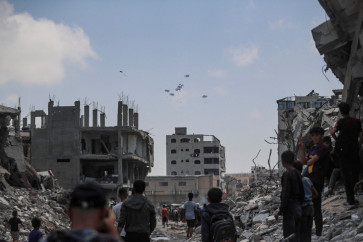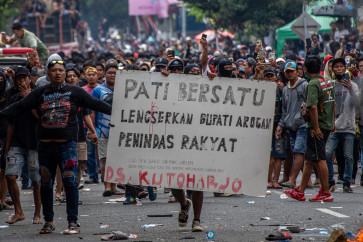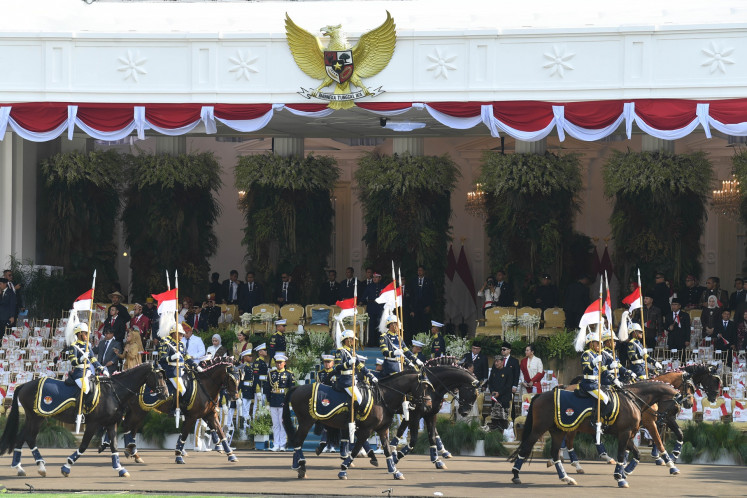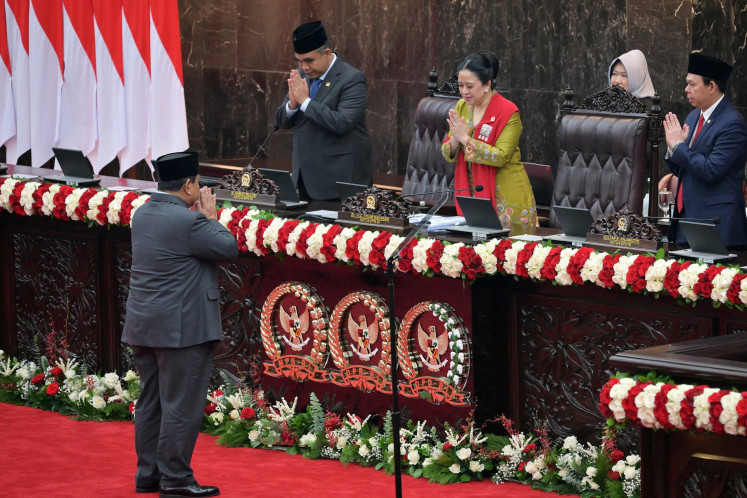Popular Reads
Top Results
Can't find what you're looking for?
View all search resultsPopular Reads
Top Results
Can't find what you're looking for?
View all search resultsThe role of religion in creating global peace
The 2nd World Peace Forum held by Muhammadiyah, Cheng Ho Foundation and the Center for Dialogue and Cooperation among Civilizations (CDCC) on June 24-26, 2008, which is a meeting of religious and political leaders of several countries in the world, asks how to involve religious values in establishing peace
Change text size
Gift Premium Articles
to Anyone
The 2nd World Peace Forum held by Muhammadiyah, Cheng Ho Foundation and the Center for Dialogue and Cooperation among Civilizations (CDCC) on June 24-26, 2008, which is a meeting of religious and political leaders of several countries in the world, asks how to involve religious values in establishing peace.
Such a forum is interesting to study, particularly to discuss the potential effectiveness of religion in reducing global violence. In the past seven years, there have been similar forums held by religious social organizations, such as the Summit of World Muslim Leaders in Jakarta 2001. It was attended by 180 Muslim leaders and scholars from 50 countries.
The conference produced "the 2001 Jakarta Declaration" consisting of three items: religiosity and spirituality, civic responsibility in political society and interfaith, intercultural and international relations. The declaration stated that Islam was a moderate religion loving peace, rejecting violence and promoting human values.
Another was the Jakarta Islamic International Conference (JIIC) in 2003. The conference discussed strengthening the role of moderate Islam in Southeast Asia. NU, Muhammadiyah and other Islamic organizations were expected to increase their role in reducing radicalism.
Two years ago, NU also held the International Conference of Islamic Scholars (ICIS). The resume of the conference was similar to the previous conference: mediating the conflict between Islam and the West, reducing religious radicalism and establishing global peace and civilization based on moderate Islam.
It is not easy to measure the influence of such international religious forums on global peace. Although there is a decrease in religious terrorist acts, particularly in Indonesia, it does not automatically mean this is the direct influence of such forums. There are some other factors affecting it such as police work, internal problems among terrorists, civil engagement in reporting the network of terrorist groups and so forth.
A statement by Hans Kung is important to quote here. In his book A Global Ethics for Global Politics and Economics (1997), he says that to involve religious values in establishing global peace is significantly important. Actually, Kung's statement became a formulation of a world religious parliament declaration in Chicago in 1992. It is known as "global ethics".
The declaration of global ethics did not aim to create a new religion, but to appreciate ethical values of religions to fight for global peace. Undeniably all religions have peaceful teachings.
Unfortunately, this fact is avoided by its followers. They tend to emphasize and to promote the claim of truth and salvation. Hence, instead of promoting and supporting a peaceful situation, religions tend to be engaged in conflict and violence.
The forums involving religions to promote global peace have more beneficial points. So far human obedience to his religion is not caused by fear of a certain person or institutions such as state and church. The compliance is forced by their belief and commitment on transcendental existence, which is God. Religion has significant power to shape personal character.
Therefore it is not surprising if many people have the courage to sacrifice themselves in bombings due to their faith. For that reason, engaging religion is needed in order to communicate that global peace is a pious and obedient endeavor before God.
Global peace has not fully been established yet. Although World War I and II injured people and have remained a traumatic experience, it seems the desire to wage war is still strong. The conflict within the Middle East and the involvement of Western countries shows the future of global peace is doubtful.
Accordingly, "the state orientation" as stated by Cardinal Richelieu has become united with the politics of diplomacy of elites. In such a paradigm, the highest orientation is the glory and the advance of state that enables them to make any policies supporting its goal.
Hence, humanity can be disturbed or destroyed if it does not hold up the goal. Obviously this view is based on Niccolo Machiavelli's political thought. The tendency of war among countries results from this kind of view.
To involve religions in reducing violence and promoting a global peace could be seen as a traditional approach. Religion comes from the old period, hundreds or thousands of years ago. It is a heritage of the past.
It does not mean, however, that religion has no ability to solve a contemporary problem. Moreover, religion has sacred values.
Hence, these religious forums are an alternative approach complementing other methods. Hopefully global peace can be achieved as soon as possible.
The writer is a lecturer at Muhammadiyah University and a member of Pemuda Muhammadiyah.










